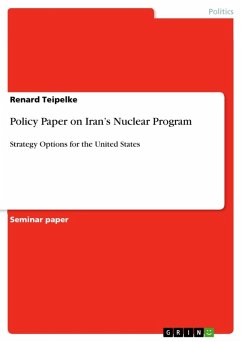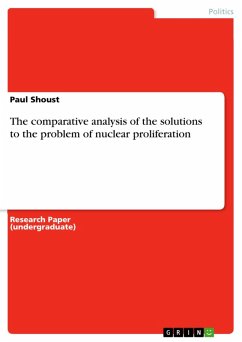
Combating Proliferation (eBook, ePUB)
Strategic Intelligence and Security Policy

PAYBACK Punkte
8 °P sammeln!
Selected by Choice Magazine as an Outstanding Academic TitleThe intelligence community's flawed assessment of Iraq's weapons systems-and the Bush administration's decision to go to war in part based on those assessments-illustrates the political and policy challenges of combating the proliferation of weapons of mass destruction. In this comprehensive assessment, defense policy specialists Jason Ellis and Geoffrey Kiefer find disturbing trends in both the collection and analysis of intelligence and in its use in the development and implementation of security policy.Analyzing a broad range of re...
Selected by Choice Magazine as an Outstanding Academic TitleThe intelligence community's flawed assessment of Iraq's weapons systems-and the Bush administration's decision to go to war in part based on those assessments-illustrates the political and policy challenges of combating the proliferation of weapons of mass destruction. In this comprehensive assessment, defense policy specialists Jason Ellis and Geoffrey Kiefer find disturbing trends in both the collection and analysis of intelligence and in its use in the development and implementation of security policy.Analyzing a broad range of recent case studies-Pakistan's development of nuclear weapons, North Korea's defiance of U.N. watchdogs, Russia's transfer of nuclear and missile technology to Iran and China's to Pakistan, the Soviet biological warfare program, weapons inspections in Iraq, and others-the authors find that intelligence collection and analysis relating to WMD proliferation are becoming more difficult, that policy toward rogue states and regional allies requires difficult tradeoffs, and that using military action to fight nuclear proliferation presents intractable operational challenges.Ellis and Kiefer reveal that decisions to use-or overlook-intelligence are often made for starkly political reasons. They document the Bush administration's policy shift from nonproliferation, which emphasizes diplomatic tools such as sanctions and demarches, to counterproliferation, which at times employs interventionist and preemptive actions. They conclude with cogent recommendations for intelligence services and policy makers.
Dieser Download kann aus rechtlichen Gründen nur mit Rechnungsadresse in A, B, BG, CY, CZ, D, DK, EW, E, FIN, F, GR, HR, H, IRL, I, LT, L, LR, M, NL, PL, P, R, S, SLO, SK ausgeliefert werden.













